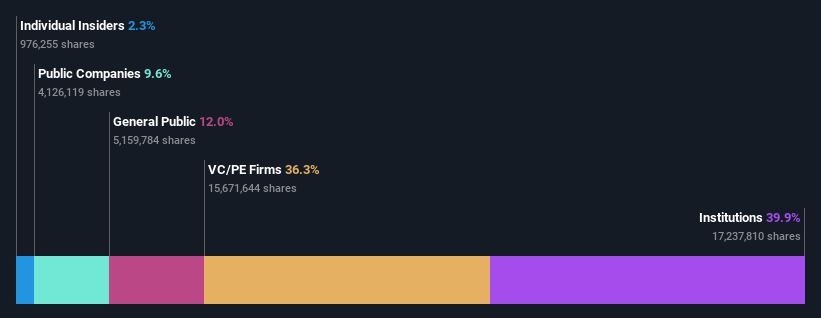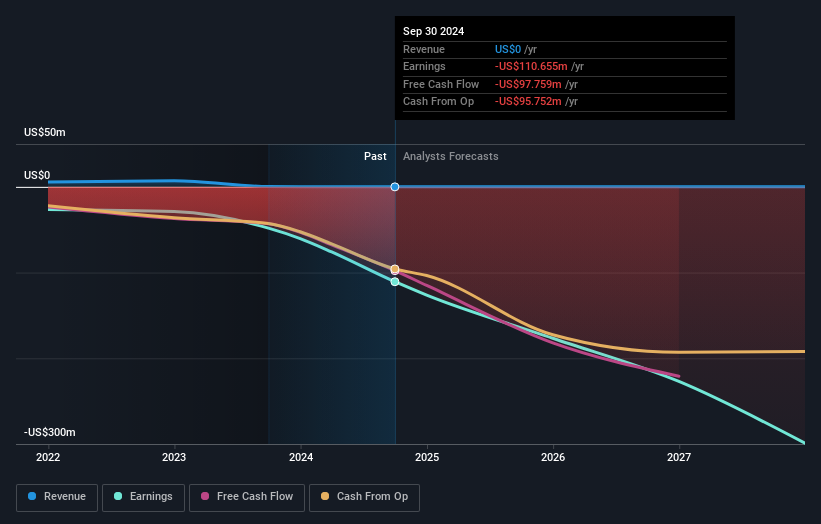- United States
- /
- Biotech
- /
- NasdaqGS:KYTX
institutional investors of Kyverna Therapeutics, Inc. (NASDAQ:KYTX) must be disappointed after last week's 16% drop

Key Insights
- Given the large stake in the stock by institutions, Kyverna Therapeutics' stock price might be vulnerable to their trading decisions
- 51% of the business is held by the top 6 shareholders
- Ownership research along with analyst forecasts data help provide a good understanding of opportunities in a stock
If you want to know who really controls Kyverna Therapeutics, Inc. (NASDAQ:KYTX), then you'll have to look at the makeup of its share registry. The group holding the most number of shares in the company, around 40% to be precise, is institutions. That is, the group stands to benefit the most if the stock rises (or lose the most if there is a downturn).
And last week, institutional endured the biggest losses as the stock fell by 16%.
Let's delve deeper into each type of owner of Kyverna Therapeutics, beginning with the chart below.
See our latest analysis for Kyverna Therapeutics

What Does The Institutional Ownership Tell Us About Kyverna Therapeutics?
Institutions typically measure themselves against a benchmark when reporting to their own investors, so they often become more enthusiastic about a stock once it's included in a major index. We would expect most companies to have some institutions on the register, especially if they are growing.
As you can see, institutional investors have a fair amount of stake in Kyverna Therapeutics. This implies the analysts working for those institutions have looked at the stock and they like it. But just like anyone else, they could be wrong. When multiple institutions own a stock, there's always a risk that they are in a 'crowded trade'. When such a trade goes wrong, multiple parties may compete to sell stock fast. This risk is higher in a company without a history of growth. You can see Kyverna Therapeutics' historic earnings and revenue below, but keep in mind there's always more to the story.

Kyverna Therapeutics is not owned by hedge funds. Vida Ventures Advisors, LLC is currently the largest shareholder, with 10% of shares outstanding. For context, the second largest shareholder holds about 10% of the shares outstanding, followed by an ownership of 9.6% by the third-largest shareholder.
On further inspection, we found that more than half the company's shares are owned by the top 6 shareholders, suggesting that the interests of the larger shareholders are balanced out to an extent by the smaller ones.
While it makes sense to study institutional ownership data for a company, it also makes sense to study analyst sentiments to know which way the wind is blowing. There are plenty of analysts covering the stock, so it might be worth seeing what they are forecasting, too.
Insider Ownership Of Kyverna Therapeutics
The definition of company insiders can be subjective and does vary between jurisdictions. Our data reflects individual insiders, capturing board members at the very least. The company management answer to the board and the latter should represent the interests of shareholders. Notably, sometimes top-level managers are on the board themselves.
Most consider insider ownership a positive because it can indicate the board is well aligned with other shareholders. However, on some occasions too much power is concentrated within this group.
We can report that insiders do own shares in Kyverna Therapeutics, Inc.. As individuals, the insiders collectively own US$3.4m worth of the US$149m company. It is good to see some investment by insiders, but we usually like to see higher insider holdings. It might be worth checking if those insiders have been buying.
General Public Ownership
The general public-- including retail investors -- own 12% stake in the company, and hence can't easily be ignored. While this group can't necessarily call the shots, it can certainly have a real influence on how the company is run.
Private Equity Ownership
With an ownership of 36%, private equity firms are in a position to play a role in shaping corporate strategy with a focus on value creation. Some investors might be encouraged by this, since private equity are sometimes able to encourage strategies that help the market see the value in the company. Alternatively, those holders might be exiting the investment after taking it public.
Public Company Ownership
We can see that public companies hold 9.6% of the Kyverna Therapeutics shares on issue. This may be a strategic interest and the two companies may have related business interests. It could be that they have de-merged. This holding is probably worth investigating further.
Next Steps:
It's always worth thinking about the different groups who own shares in a company. But to understand Kyverna Therapeutics better, we need to consider many other factors. Take risks for example - Kyverna Therapeutics has 4 warning signs (and 2 which shouldn't be ignored) we think you should know about.
If you are like me, you may want to think about whether this company will grow or shrink. Luckily, you can check this free report showing analyst forecasts for its future.
NB: Figures in this article are calculated using data from the last twelve months, which refer to the 12-month period ending on the last date of the month the financial statement is dated. This may not be consistent with full year annual report figures.
Valuation is complex, but we're here to simplify it.
Discover if Kyverna Therapeutics might be undervalued or overvalued with our detailed analysis, featuring fair value estimates, potential risks, dividends, insider trades, and its financial condition.
Access Free AnalysisHave feedback on this article? Concerned about the content? Get in touch with us directly. Alternatively, email editorial-team (at) simplywallst.com.
This article by Simply Wall St is general in nature. We provide commentary based on historical data and analyst forecasts only using an unbiased methodology and our articles are not intended to be financial advice. It does not constitute a recommendation to buy or sell any stock, and does not take account of your objectives, or your financial situation. We aim to bring you long-term focused analysis driven by fundamental data. Note that our analysis may not factor in the latest price-sensitive company announcements or qualitative material. Simply Wall St has no position in any stocks mentioned.
About NasdaqGS:KYTX
Kyverna Therapeutics
A clinical-stage biopharmaceutical company, focuses on developing cell therapies for patients suffering from autoimmune diseases.
Flawless balance sheet slight.
Market Insights
Community Narratives




